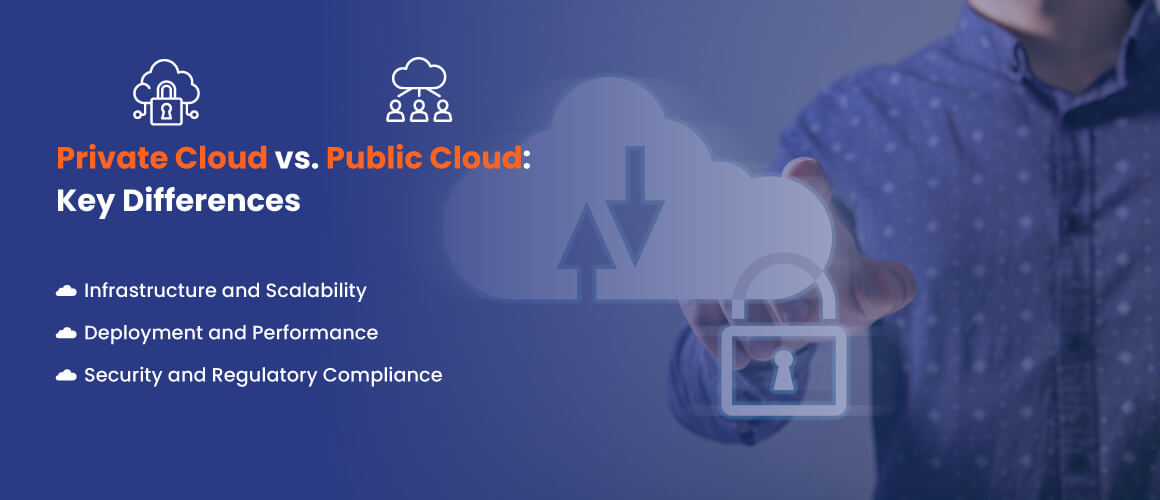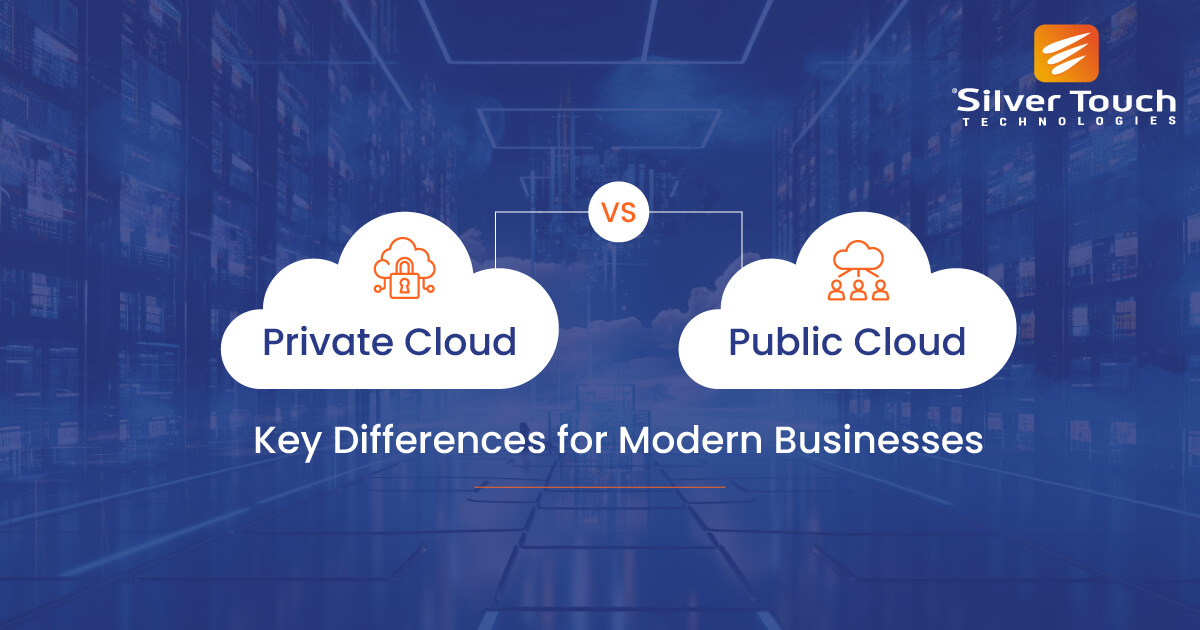The modern corporate world is challenging and lucrative at the same time. This is why every business, irrespective of its size, opts for scalable cloud-based solutions. Cloud solutions offer the necessary storage, computing, and software delivery facilities cost-effectively. Companies can go for public cloud hosting, private cloud hosting, or a hybrid model to leverage its benefits.
Here is the catch. Companies must understand the differences between public vs private cloud, otherwise, they may get the wrong solution. Though the cloud serves as a versatile platform for driving growth, it is essential to select the best cloud hosting for business. This blog talks about the key characteristics of public cloud hosting and private cloud hosting with their differences.
Public Cloud Hosting- Overview and Importance
A public cloud offers services over the Internet for multiple companies together. The public cloud hosting provider handles maintenance, security, and updates so businesses can access the necessary resources without hardware. Public cloud hosting is highly scalable and cost-efficient as it helps reduce upfront costs. It offers the necessary elasticity and flexibility on demand.
Let’s go through the key pros and cons of the public cloud.
Pros and Cons of Public Cloud Hosting
Public cloud hosting solutions have some advantages and disadvantages. Here is a quick table of their pros and cons.
| Pros of Public Cloud | Cons of Public Cloud |
| Quick scaling of resources as per demand | Less control over infrastructure and resource management |
| Reduced upfront costs with pay-per-use model | Shared infrastructure poses security risks for corporate data |
| Quick setup as the provider maintains everything | May not meet stringent, industry-specific regulations |
| Pay only for what you use | Switching between providers is difficult |
Private Cloud Hosting- Overview and Importance
Private cloud hosting offers an exclusive platform for a company or organization. It is not possible to share private clouds. It provides the highest level of security and custom protocols to encrypt sensitive or private data. Customized resources are necessary for implementing the necessary tools, and this type of hosting offers an on-premise or externally hosted private cloud.
Here, it is fair to mention that private cloud hosting solutions have some benefits and disadvantages.
Pros and Cons of Private Cloud Hosting
Here are the major pros and cons of the private cloud.
| Pros of Private Cloud | Cons of Private Cloud |
| It offers complete control over corporate data and infrastructure | It has higher upfront and ongoing costs than the public cloud |
| It is possible to customize the infrastructure to address business needs | Managing private cloud solutions needs technical expertise and resources |
| It offers more robust protection to sensitive corporate data as compared to the public cloud | Scaling of a private cloud is a slow and expensive process. |
It is interesting to dig deep into the detailed difference between public vs private cloud solutions.
Key Differences between Private Cloud vs. Public Cloud

We can consider several key factors while differentiating a public vs private cloud. Let’s dig in.
Infrastructure and Scalability
private cloud infrastructure offers dedicated resources with customization options. On the other hand, the public cloud offers a scalable infrastructure with shared resources. Moreover, the public cloud remains more cost-efficient when it comes to increasing scalability.
Deployment and Performance
Deployment of the private cloud takes more time than the same for the public cloud. However, when we talk about public cloud vs private cloud performance, the latter has an upper hand. Public cloud deployment is simpler, but companies may need to compromise on performance.
Security and Regulatory Compliance
We can easily differentiate between public cloud vs private cloud security. The private cloud is more secure and compliant than the public cloud. It is because security is a shared responsibility in the public cloud, whereas the private cloud offers more control to meet specific security requirements.
Here is a quick table of comparison between two cloud hosting solutions-
| Private Cloud | Public Cloud |
| Assures exclusive resources | Offers shared resources |
| Scalability is less | Scalability is higher |
| Higher security and compliance | Limited security and compliance |
| More control and customization | Less control and provider-dependent customization |
| Deployment takes time | Deployment is quick and simple |
Hope this detailed cloud hosting comparison will assist you in choosing the most suitable solution for your company.
Hybrid Cloud- Best of Both Worlds
A hybrid cloud is a combination of public and private clouds. It enables companies to maintain their sensitive information in a secure private cloud while taking advantage of the scalability of public cloud solutions. It offers high flexibility for optimizing resources as per the demand. Moreover, it maintains a subtle balance between scalability and security.
It is better to consult a reputed provider to choose the right solution and get the cloud hosting benefits for your company.
How Silver Touch Technologies Helps You Choose the Right Solution
Silver Touch Technologies is a trusted cloud service provider. We offer cutting-edge cloud hosting solutions designed to optimize the performance, stability, and security of your business applications. Our in-house team of experienced professionals offers continuous monitoring, seamless integration, and scalable infrastructure to meet your specific business needs.
Our Silver Cloud solution is an ultra high-performance platform with a dedicated cloud hosting data center for 24x7 monitoring. It offers flexible deployment and a 99.9 percent uptime guarantee. We ensure physical and network security in our advanced cloud solutions. Moreover, your company can get a robust solution compliant to run SAP Business One and other web apps.
Concluding Lines
Simply put, when you require greater control over IT infrastructure with robust security and customization, a private cloud should be your choice. However, if you are in search of a solution that offers more scalability and cost-efficiency with some sort of security issues, a public cloud is a better option. It is beneficial to consult the cloud service provider to select the right choice.
Making a decision between a private cloud and a public cloud is a bit difficult and cumbersome. You can consider the pros and cons of both cloud solutions and understand specific business needs in selecting the right solution. The hybrid cloud solution is also a good option to consider as it can combine the benefits of both public and private cloud solutions.
FAQs
What is the difference between public and private cloud hosting?
Public cloud hosting offers services over the internet with shared resources managed by a provider, while private cloud hosting provides dedicated resources exclusively for one organization with greater control and security.
Is public cloud hosting more cost-effective than private cloud hosting?
Yes, public cloud hosting is generally more cost-effective due to reduced upfront costs and a pay-per-use model, whereas private cloud hosting involves higher costs for setup, customization, and maintenance.
Which cloud model offers better security and compliance?
Private cloud hosting offers better security and compliance because it provides exclusive infrastructure and more control. Public cloud relies on shared infrastructure, which may not meet stringent industry regulations.
Can private cloud infrastructure be scaled easily?
Scaling a private cloud is possible but often slower and more expensive compared to the highly scalable nature of public cloud hosting.
What is a hybrid cloud, and when is it useful?
A hybrid cloud combines both private and public cloud environments. It’s useful for companies that want to secure sensitive data in a private cloud while leveraging the scalability and flexibility of a public cloud.
